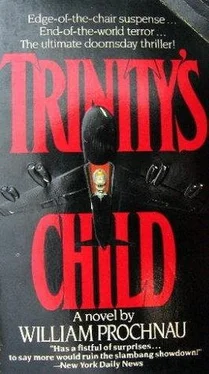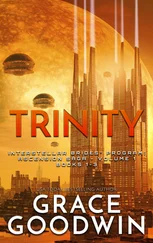“Russians?”
“Fifteen, twenty million. Maybe thirty million with the side effects. If we can stop.”
“So we have lost.”
Harpoon sagged in despair. “Sir,” he said desolately, “this isn’t victory by body count. Can’t you understand? It isn’t over, for God’s sake. Our bombers are under way for a second strike. Our submarines have been given predetermined orders for a third strike. We can’t talk to our submarines. We can’t talk to the Russians. Between us we have more than forty thousand warheads left. We don’t know how to stop it.” He slumped further, feeling trapped and helpless. “It isn’t over,” he repeated hauntedly. “It’s out of control.”
* * *
“Eighty miles,” Radnor’s voice droned into the cockpit. “Seventy.”
“Foxbat!” Kazakhs demanded the specs on their adversaries.
“Top speed, Mach two-point-eight,” Moreau replied. “Range fifteen hundred miles. One way. Toughest in high-altitude dogfights. Most sophisticated—”
“Armaments?” Kazakhs interrupted. He knew the Foxbat was sophisticated—maybe too sophisticated—and he already had begun calculating that to his advantage, the tortoise plotting against the hare. The fighters were three minutes away. If they missed on this run—and they could, because they were approaching too fast—their speed would take them on a long looping tum, giving him invaluable time.
“Four AA-6 ACRID air-to-air missiles,” Moreau replied immediately. “Warheads nonnuclear. Heat-seekers, range fifty miles. Radar-guided, range twenty miles. They’ll try ’em both ways. Gun pack, two twenty-three-millimeter machine guns.”
“Sixty miles.”
“Evasive action,” Kazakhs ordered. His words were distant now, as if they were trailing several moves behind his mind. “Close air intakes. Hokay, buddies, let’s see how the cossacks like their eggs fried in their own grease.”
Moreau began the swaying, groaning maneuver back into the radioactive cloud. “Fifty miles,” Radnor said. “Forty miles. Missiles launched! One. Two…” He paused. “Six launches!”
“Decoys out!”
“Decoys dispatched.” Halupalai instinctively placed his hand on the Gatling-gun trigger, the Vietnam reflex, and then pulled it back.
“Thirty miles.”
“Clouds?” Kazakhs wanted the red crud badly, not only because it would spook the racing MIG pilots but more importantly because the dancing radioactivity might clutter the missile guidance systems.
Downstairs, Radnor stared at his radar. He saw six little blips racing at him, four larger ones swooping ahead of the missiles and climbing. From the other direction the fog was creeping slowly across his screen, nearing the center. ‘Twenty degrees left,” he said. “Countdown?”
“No time,” Kazakhs barked. ‘Twenty degrees left,” he repeated.
tMoreau reacted. Radnor interrupted. “Bandits twenty miles. They’re climbing, commander.”
“Yeah, they screwed up. They were up our gazoom before they saw us. They’re trying to eat speed.”
The pilot’s voice crackled with tension. But it also carried the slightest touch of satisfaction. He knew that a B-52, once it was found, could be shot down by almost anything that flew. He needed every edge he could get.
The successor had gone silent again. Harpoon peered out at him. He seemed in a daze, so lost and alone. A wave of sympathy flooded through Harpoon, then departed swiftly. He felt alone too, grappling with forces careening out of his control. Suddenly, in the faint light, Harpoon thought he saw in the phallic shadow of the Secret Service agent’s gun barrel what Icarus must have seen in the projection of Soviet missiles arching down on him in Omaha. The thought startled him. The pressure was getting to him. Then he saw Icarus sending him away—Godspeed, God grace. He saw the unfrightened face of his young escort turn toward a last gin-rummy game, the vaulted doors sealed below him. He saw the rockets’ red glare of a long-ago Fourth of July, the future stretched limitlessly beneath him in the monumental splendor of his nation’s capital, and he heard his bride whisper, Never say good-bye. And he pulled himself together, signaled the projectionist to bring up the third map, and decided to plod on, his way.
“Sir,” Harpoon said, “you should briefly examine how other nations reacted.” The successor said nothing. Harpoon flashed a wobbling light on the world. “Most of the less-developed nuclear powers responded reflexively. So did Israel. Only Britain and France held off.”
“Our allies,” the successor said, his voice still vacant and hollow.
Harpoon ignored him, wanting to hurry through this part. “The Soviets made no move against Western Europe, moved no troops and launched no weapons. Nor did they move against the Middle East, although the Israelis did. The Israelis always have sought buffer zones—the kind they tried to create in the Sinai, the Golan Heights, Lebanon. They also tend to move when the rest of the world is preoccupied. We were very preoccupied.” He took a deep breath and added: “They created a rather large buffer zone.”
Harpoon’s pointer moved quickly through the Middle East. The red splashed erratically. In Syria, Damascus was red, as was Amman in Jordan, Baghdad in Iraq, Tehran and other targets in Iran. Splotches dotted the region of the world’s first civilization along the Tigris and Euphrates rivers and through the biblical regions to the edge of Jerusalem and the Dead Sea. The destruction leaped over Egypt to the west but continued along the Mediterranean through Libya. Harpoon’s pointer quickly moved back over the Persian Gulf to the Indian subcontinent.
“Others acted completely irrationally.” The pointer skirted past red starbursts in Pakistan and India. “Apparently a defective Chinese missile, aimed at Soviet Central Asia, landed in northern Pakistan near the capital of Islamabad. The Paks thought it came from India. They hit New Delhi with the few crude weapons they had. India responded, also with crude weapons, hitting both Islamabad and Karachi.”
The successor groped through the maps, his mind inundated, his instincts telling him to take control. Somehow. He remembered the concern about Pakistan when the Soviets invaded Afghanistan. “Sounds like a Soviet conspiracy to me,” he blurted. “They always wanted Pakistan.”
Harpoon stumbled to a stop. The colonel broke in. “The President has a point, admiral. The Soviets always wanted a warm-water port. Taking Pakistan gives them one.”
Harpoon felt like laughing. But he knew the colonel was starting his play for the man. “What in God’s name would the Soviets do with a warm-water port after this?” he asked.
“Straight down the Indus River to the Arabian Sea,” the successor said with new enthusiasm. Let them know you understand strategic thinking too.
“Nothing,” the colonel said smugly. “If we stop them.”
“Giving them access to the Indian Ocean,” the successor said. The two military men were talking around him, but he ignored it. He felt relieved. Let them know you understand the Soviet mind.
Harpoon waved the colonel off, glanced hurriedly at his watch, and continued. He moved the pointer far south. “We don’t have any notion what happened in South Africa. They had primitive weapons. They exploded them in their own territory. The motives may have been racial.”
The pointer skittered back to Asia. “Other than the two superpowers, the Chinese did the most damage and took the worst beating.” The pointer moved quickly along the endless frontier from Samarkand to Vladivostok. “The Soviets had about fifty divisions along the border. The Chinese tried to destroy them. They may have incapacitated a fourth of the Soviet border forces. The Soviets used tactical weapons against Chinese border troops, then, moments before we launched our first major wave of ICBM’s—” Harpoon faltered again, puzzled, as Alice had been, by the American attack sequence. But he pushed on, not wanting to clutter the problem further—“the Soviets hit Peking and the industrial city of Wuhan with thermonuclear weapons. They appear to have stopped after that.”
Читать дальше












